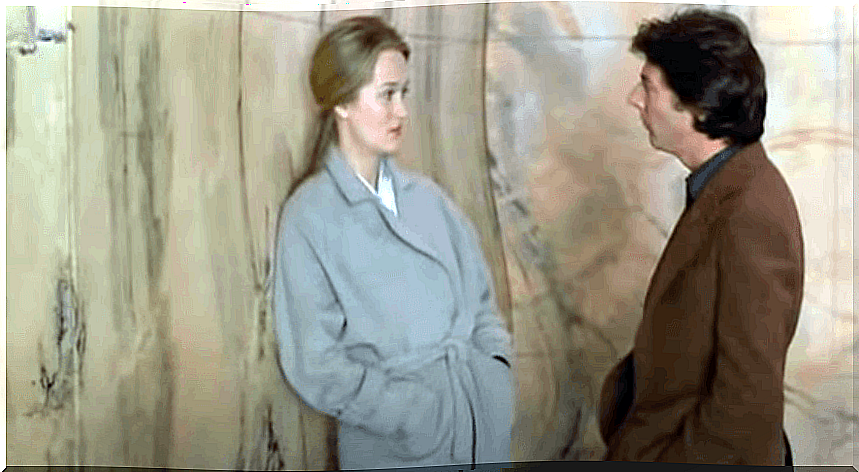Kramer Vs. Kramer: Children In Divorce

On December 19, 1979, Kramer vs. Kramer hit theaters and with the movie so did the magnificent performances of Meryl Streep and Dustin Hoffman. The film won five Oscars, including Best Picture.
Kramer vs. Kramer may not be what is called a cult movie, a movie that makes a big impact on the viewer. It has no earthquakes, meteorites, or passionate romances. However, Robert Benton created a fresh film out of Avery Corman’s novel.
This Stanley R. Jaffe production is an example of wisdom, insight, compassion and sensitivity towards the feelings that can arise in a divorce process.
Kramer vs. Kramer: Plot
When the movie begins, Joanna Kramer (Meryl Streep) is lying next to her 6-year-old son, kissing him and telling him how much she loves him. Then he turns around to finish packing his luggage.
Ted, her husband, is an advertising executive, he just got a promotion and the promise to participate in a project that appeals to him. When she gets home, she expects Joanna to share her euphoria. After all, she has been working so hard for herself and the boy. When she talks to him about her intention to leave, he has a hard time assimilating what is happening. But Joanna wants to find herself, her own place in society, her own identity.
Before marriage, she had had a good job. Now she is simply Ted’s wife, the mother of his son, a homemaker. A life in the shadows that has become intolerable. She is not even sure that she can function well as a mother any longer. He tries, unsuccessfully, to convince Ted that what motivates his departure is concern for his own son.
Kramer vs. Kramer: A Memorable Cast of Actors and Actresses
Each performance is a small miracle of perfection, not just from Hoffman and Streep, who dominate the image, but from each of the supporting roles as well. The film has the virtue of being brave and the actors have the ability to accompany that virtue.
Neighbor Jane Alexander is all tenderness and concern. Divorced, she tries to comfort and help Ted knowing how difficult the challenge of change is. Howard Duff reluctantly plays the role of Ted’s attorney, a man who seriously warns him how tough the custody trial can be.
Secondary characters
There are other accompanying supporting performances as well, such as George Coe, who plays the role of mentor to Ted’s agency. A man who would rather celebrate than face the demands of any relationship at home. Here we see portrayed the lack of sensitivity that prevailed in certain environments regarding the situation that parents with problems in their relationship could be going through.
In the middle of these performances, we find that of little Justin Henry, as the son. In a way, he is the one who achieves credibility for the roles of the rest of the actors. He is adorable and manages to masterfully draw the relationships between father and son, mother and son, father and neighbor, father and a one-night stand.
His sensitivity and naturalness is what gives the film shine, what hooks us on the plot. Without his role, without the credibility he gives to his character, the story would not hold up.
Ted Kramer: becoming a father
This part of the film makes us connect emotionally with the father. Perhaps we anticipate, as spectators, that he will not know how to take care of his son. However, the film forces us to stop being spectators, it invites us to put ourselves in their shoes. Above his lack of skill or habit, Ted reveals himself as a father who loves his son
The triumph of affection
Ted tries to get closer to the boy he never had time for: cook his breakfast, take him to school, put him to bed at night, take care of him when he’s sick, etc. Sad and lost at first, longing for his mother, the child gradually learns to trust and then love his father.
Perhaps the most moving moment in the movie is when Ted tells him that his mother has not left because she has stopped loving him. Somehow, it is Ted who takes responsibility, in front of his son, that the mother has left. Thus, the fact that the child can get rid of that feeling of guilt allows him to get closer to his father.

Kramer vs. Kramer and the Difficulty of a Custody Case
Meanwhile things are not going too well in the office. Instead of spending 150% of his time on his career, Ted is now late for some meetings. You have to skip a birthday party or take time off work when your child has a fever.
Eventually, you lose a job and are fired. Just then, when her career hits rock bottom, Joanna returns to her life. She claims that she has found herself. You have a responsible job. Now she wants custody of the child.
Kramer vs. Kramer goes beyond divorce. It’s a child custody case. From parents who love their child and want the best for him, without having the manual on how to achieve it. Kramer vs. Kramer is a film that, far from taking us into a confrontation between two people who once loved each other, teaches us how to build a new type of relationship for the sake of a common child.









